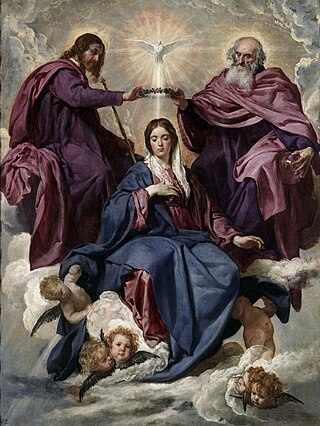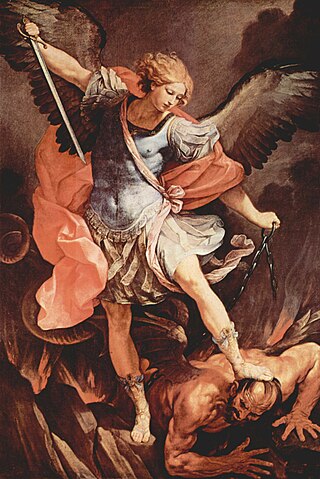
The Lord's Prayer, also called the Our Father or Pater Noster, is a central Christian prayer which Jesus taught as the way to pray. Two versions of this prayer are recorded in the gospels: a longer form within the Sermon on the Mount in the Gospel of Matthew, and a shorter form in the Gospel of Luke when "one of his disciples said to him, 'Lord, teach us to pray, as John taught his disciples'". Regarding the presence of the two versions, some have suggested that both were original, the Matthean version spoken by Jesus early in his ministry in Galilee, and the Lucan version one year later, "very likely in Judea".

Queen of Heaven is a title given to the Virgin Mary, by Christians mainly of the Catholic Church and, to a lesser extent, in Anglicanism, Lutheranism, and Eastern Orthodoxy. The title has long been a tradition, included in prayers and devotional literature and seen in Western art in the subject of the Coronation of the Virgin from the High Middle Ages, long before it was given a formal definition status by the Church.

"Gloria in excelsis Deo" is a Christian hymn known also as the Greater Doxology and the Angelic Hymn/Hymn of the Angels. The name is often abbreviated to Gloria in Excelsis or simply Gloria.

Eternal Rest or Requiem aeternam is a Western Christian prayer asking God:

The Angelus is a Catholic devotion commemorating the Incarnation of Christ. As with many Catholic prayers, the name Angelus is derived from its incipit—the first few words of the text: Angelus Domini nuntiavit Mariæ. The devotion is practiced by reciting as versicle and response three Biblical verses narrating the mystery, alternating with the prayer "Hail Mary". The Angelus exemplifies a species of prayers called the "prayer of the devotee".
Absolution is a theological term for the forgiveness imparted by ordained Christian priests and experienced by Christian penitents. It is a universal feature of the historic churches of Christendom, although the theology and the practice of absolution vary between Christian denominations.

The "Salve Regina", also known as the "Hail Holy Queen", is a Marian hymn and one of four Marian antiphons sung at different seasons within the Christian liturgical calendar of the Catholic Church. The Salve Regina is traditionally sung at Compline in the time from the Saturday before Trinity Sunday until the Friday before the first Sunday of Advent. The Hail Holy Queen is also the final prayer of the Rosary.

"Alma Redemptoris Mater" is a Marian hymn, written in Latin hexameter, and one of four seasonal liturgical Marian antiphons sung at the end of the office of Compline.

The Divine Service is a title given to the Eucharistic liturgy as used in the various Lutheran churches. It has its roots in the Pre-Tridentine Mass as revised by Martin Luther in his Formula missae of 1523 and his Deutsche Messe of 1526. It was further developed through the Kirchenordnungen of the sixteenth and seventeenth centuries that followed in Luther's tradition.
In Christian liturgical worship, preces, also known in the Anglican prayer book tradition as the suffrages, are short petitions that are said or sung as versicles and responses by the officiant and congregation respectively. It is one of the oldest forms of prayer in Christianity, rooted in the pre-Christian Hebrew prayers of the Psalms used in Temple worship.

The Chaplet of Saint Michael the Archangel, also called the Rosary of the Angels, is a chaplet approved by Pope Pius IX in 1851.

Thanksgiving after Communion is a spiritual practice among Christians who believe in the Real Presence of Jesus Christ in the Communion bread, maintaining themselves in prayer for some time to thank God and especially listening in their hearts for guidance from their Divine guest. This practice was and is highly recommended by saints, theologians, and Doctors of the Church.

Prayer in the Catholic Church is "the raising of one's mind and heart to God or the requesting of good things from God." It is an act of the moral virtue of religion, which Catholic theologians identify as a part of the cardinal virtue of justice.

Ad Caeli Reginam is an encyclical of Pope Pius XII, given at Rome, from St. Peter's Basilica, on the feast of the Maternity of the Blessed Virgin Mary, the eleventh day of October, 1954, towards the end of the Marian year, in the sixteenth year of his Pontificate. The encyclical is an important element of the Mariology of Pope Pius XII. It established the feast Queenship of Mary.

May devotions to the Blessed Virgin Mary refer to special Marian devotions held in the Catholic Church during the month of May honoring Mary, mother of God, as "the Queen of May". These services may take place inside or outside. A "May Crowning" is a traditional Roman Catholic ritual that occurs in the month of May.

The Mariology of the popes is the theological study of the influence that the popes have had on the development, formulation and transformation of the Roman Catholic Church's doctrines and devotions relating to the Blessed Virgin Mary.

The Immaculata prayer is a Traditional Catholic Marian prayer composed by Saint Maximillian Kolbe.

The Queen of Angels Foundation is an association of lay faithful of the Catholic Church dedicated to fostering devotion to Mary, Mother of Jesus. The Foundation is a volunteer group of lay men and women who "...strive together in a common endeavor to foster a more perfect life for themselves and their community by promoting reverence for the Blessed Virgin Mary, in whose name, as Our Lady of the Angels, the City and Archdiocese of Los Angeles were founded..." and whom Catholics revere as Queen of Heaven and Empress of the Americas.

The Litany of the Holy Name of Jesus is a formal prayer in the Catholic Church dedicated to the Holy Name of Jesus. It is one of six formal prayers approved by the Catholic Church for public and private use. This Litany carries a partial indulgence. It is believed that the Litany of the Holy Name of Jesus was written by SS. Bernardine of Siena and John Capistran in the 15th century.














